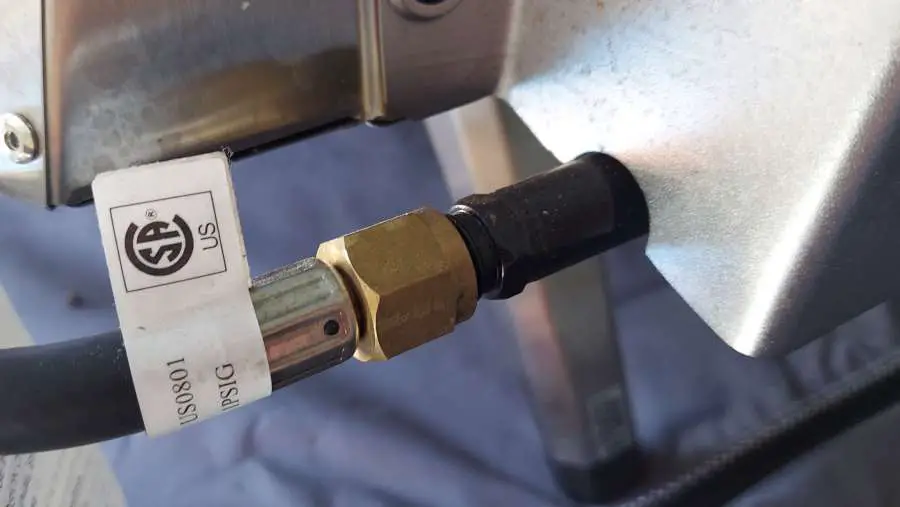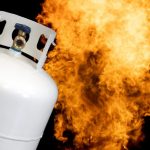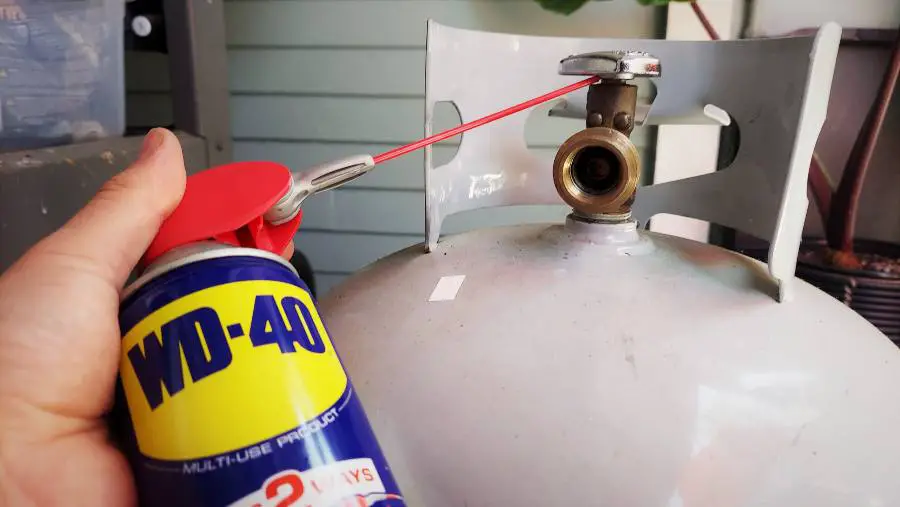Propane is a versatile and widely used fuel source, essential for various applications such as heating, cooking, and powering appliances, especially in off-grid and self-sufficient living environments. However, a common question that arises is, “Does propane go bad?” Understanding the longevity and stability of propane is crucial for anyone relying on it for their energy needs.
In this article, I will talk about the shelf life of propane, its proper storage conditions, and what factors, if any, can affect its usability over time. By the end, you’ll have a clear understanding of how to manage and store propane effectively to ensure it remains a reliable energy source for your needs.
To answer the question directly: No, propane does not go bad, but improper storage can impact its performance and safety. I know I for one was not aware that propane had an “infinite” shelf life when I first started using propane, and assumed that it could go bad. But after learning more about propane and experience over the years utilizing it, I truly learned how great of a fuel source it is compared to other options. Let’s explore this in detail.
Background on Propane
Propane is a cornerstone for many who need portable or off-grid fuel sources, offering a reliable and portable energy source that can be used in a variety of applications. From heating homes and powering generators to fueling stoves and grills, propane’s versatility makes it an invaluable resource for those who want to power their lifestyle without requiring a dedicated connection the to the grid. Its availability in different tank sizes and the ability to store it for long periods make it particularly attractive for off-grid enthusiasts and those who travel in RV’s.
Understanding the longevity and stability of propane is crucial for anyone relying on it for their daily needs. Knowing whether propane can go bad helps in planning storage solutions and ensures that you are always prepared with a dependable fuel source. Proper storage practices not only maintain the fuel’s effectiveness but also enhance safety, preventing leaks and potential hazards.
The benefits of propane include its clean-burning properties, which make it a more environmentally friendly option compared to other fuel types. It produces fewer pollutants, contributing to a healthier living environment, especially in confined spaces common in off-grid setups such as RV’s. Additionally, propane’s energy efficiency translates to cost savings, as it burns hotter and more efficiently than many other fuels.
In this context, the question of whether propane goes bad is significant. Ensuring that propane remains usable over long periods can impact the success and sustainability of off-grid projects, such as cabins in the woods that are not often visited or refueled. By understanding the characteristics of propane and how to store it correctly, you can optimize its use, minimize waste, and enhance the safety and reliability of your energy supply.
In this article, I’ll provide practical insights and detailed guidance on how to manage and store propane effectively. This knowledge will empower you to make informed decisions, ensuring that your propane supply remains a robust and reliable part of your off-grid lifestyle.
Some Details About Propane
To fully understand the shelf life and proper storage of propane, it’s essential to familiarize yourself with some key terms and concepts related to propane and its use. Here, I’ll provide clear definitions and explanations to enhance your knowledge and comprehension of this vital energy source.
Propane (C3H8): Propane is a hydrocarbon gas (chemical formula C3H8) commonly used as fuel. It is part of the liquefied petroleum gas (LPG) family, which also includes butane. Propane is produced as a byproduct of natural gas processing and petroleum refining. It is stored and transported in a liquid state under pressure but becomes a gas when released from its container.
LPG (Liquefied Petroleum Gas): LPG is a mixture of hydrocarbon gases, primarily propane and butane, used as fuel for heating, cooking, and automotive purposes. LPG is stored under pressure to keep it in a liquid form, making it easy to transport and store. Propane is often preferred over butane in colder climates because it remains in a usable gaseous state at lower temperatures.
Shelf Life of Propane
Propane itself does not degrade over time. Unlike gasoline or diesel, which can oxidize and form gums or varnishes, propane remains stable indefinitely if stored properly. This is a great advantage for those who need a stable fuel source for off-grid locations or for backup situations, such as home generators.
Propane Storage and Safety
Proper storage is crucial for maintaining propane’s effectiveness and ensuring safety. Key considerations include:
- Tank Condition: Regularly inspect tanks and cylinders for rust, damage, or leaks. A compromised container can lead to propane leaks, which are hazardous.
- Storage Location: Store propane tanks in a cool, well-ventilated area away from direct sunlight and heat sources. Avoid enclosed spaces to prevent the buildup of gas in case of a leak. Always store propane tanks vertically, and do not lay them on their side.
- Temperature: Propane can be stored in a wide range of temperatures, but extreme heat can increase the pressure inside the tank, while extreme cold can reduce the gas’s pressure, making it less effective.
Understanding these terms and concepts is vital for effectively managing and storing propane. By being informed about the properties and requirements of propane, you can ensure a reliable and safe energy supply for your off-grid projects. In the next sections, I’ll provide detailed instructions on how to store propane properly and troubleshoot common issues.
Propane Safety Tips
Safety is paramount when handling and storing propane. Here are some essential tips:
- Leak Detection:
- Be aware of the smell of propane (similar to rotten eggs). If you detect this odor, check for leaks immediately using soapy water applied to connections. Bubbles will indicate a leak.
- Proper Handling:
- When transporting propane cylinders, secure them in an upright position in your vehicle. Never leave propane tanks in a hot car for extended periods.
- Regulator Checks:
- Regularly inspect the regulator on your propane tank. A faulty regulator can cause gas leaks and affect the performance of your appliances.
Propane Usage Tips
- Efficient Use:
- To maximize the efficiency of your propane, regularly maintain your appliances. Clean burners and check connections to ensure optimal performance.
- Backup Supply:
- If you rely heavily on propane, consider having a backup supply. This ensures you won’t run out during critical times, especially in off-grid situations.
- Monitor Levels:
- Use a propane tank gauge to monitor fuel levels. This helps you plan refills and avoid running out unexpectedly.
Understanding these detailed aspects of propane can significantly enhance your ability to store and use this fuel effectively. With the right knowledge and practices, you can ensure that your propane supply remains a reliable and safe energy source for your off-grid lifestyle. In the following sections, I’ll provide step-by-step instructions for proper propane storage and tips for troubleshooting common issues.
FAQ
Does propane go bad over time?
No, propane does not go bad. It remains stable indefinitely if stored properly. Unlike other fuels, propane does not degrade, oxidize, or form gums and varnishes.
How should I store propane tanks?
Store propane tanks in a cool, well-ventilated area, away from direct sunlight and heat sources. Ensure they are kept upright and regularly inspect them for signs of damage or leaks.
What should I do if I smell propane?
If you smell propane (a rotten egg odor), immediately check for leaks by applying soapy water to connections and look for bubbles. If a leak is detected, turn off the gas supply and have the tank or connection repaired by a professional.
Can propane tanks be stored indoors?
It is generally not recommended to store propane tanks indoors due to the risk of gas accumulation in case of a leak. Store them outdoors in a well-ventilated area.
How can I check the level of propane in my tank?
You can use a propane tank gauge to monitor the fuel level. Alternatively, pour warm water down the side of the tank and feel for a cool spot, which indicates the propane level.
Is propane safe to use indoors?
Yes, propane is safe to use indoors with proper ventilation and approved appliances. Ensure that your propane appliances are well-maintained and that you have a carbon monoxide detector installed.
What is the difference between propane and natural gas?
Propane is stored as a liquid under pressure and has a higher energy content per unit volume, making it portable and suitable for off-grid applications. Natural gas is delivered via pipelines, has a lower energy content, and is generally cheaper but requires a connection to a gas utility network.
Can I refill my own propane tanks?
Yes, you can refill propane tanks at authorized refill stations. Small 1lb propane cylinders can also be refilled using appropriate adapters and following safety guidelines.
What are the signs of a faulty propane regulator?
Signs of a faulty regulator include yellow or orange flames instead of blue, inconsistent burner performance, and hissing sounds near the regulator. If you notice these signs, have the regulator inspected or replaced.
How do I dispose of old or damaged propane tanks?
Do not throw propane tanks in the regular trash. Take them to a propane supplier or a hazardous waste disposal facility for proper disposal.
These FAQs should help address common concerns and provide you with the knowledge to handle and store propane safely and effectively. If you have further questions, consulting a professional or your propane supplier can provide additional guidance.
Conclusion
In this article, I’ve explored the key aspects of propane, addressing the common question: “Does propane go bad?” We’ve established that propane remains stable and usable indefinitely when stored correctly, making it an excellent fuel choice for off-grid living and various applications. Proper storage practices, such as keeping tanks in a cool, well-ventilated area and regularly inspecting for damage, are essential to maintaining propane’s safety and effectiveness.
Understanding the properties of propane, its storage requirements, and safety considerations ensures that you can rely on this fuel source for your energy needs. The importance of propane in off-grid scenarios cannot be overstated, given its high energy density, environmental benefits, and versatility.
To recap, here are the main points covered:
- Propane Stability: Propane does not degrade over time and can be stored indefinitely under the right conditions.
- Storage Practices: Proper storage, including keeping tanks upright and in ventilated areas, is crucial for safety and performance.
- Safety Tips: Regularly check for leaks, handle tanks properly, and use approved appliances indoors with adequate ventilation.
- Differences from Natural Gas: Propane offers higher energy content and portability, making it suitable for off-grid applications, though it is generally more expensive than natural gas.
Final Tips:
- Inspect Regularly: Make it a habit to inspect your propane tanks and appliances for any signs of damage or leaks.
- Monitor Levels: Use a gauge or the warm water method to keep track of your propane levels, ensuring you never run out unexpectedly.
- Backup Supply: Consider maintaining a backup supply of propane to ensure you are always prepared, especially in off-grid or remote locations.
By following these guidelines, you can ensure that your propane supply remains a reliable and safe part of your off-grid lifestyle. Making informed decisions about storage and usage will help you maximize the benefits of propane and maintain a secure and efficient energy source for your projects.
Thank you for reading and I hope my article on the shelf life of propane and if it goes bad or not has been helpful to you. Please feel free to reach out with any questions or comments, I’d love to hear from you!
Thank you and God bless!




